Exercise-based cardiac rehabilitation for adults with heart failure
- PMID: 38451843
- PMCID: PMC10919451
- DOI: 10.1002/14651858.CD003331.pub6
Exercise-based cardiac rehabilitation for adults with heart failure
Abstract
Background: People with heart failure experience substantial disease burden that includes low exercise tolerance, poor health-related quality of life (HRQoL), increased risk of mortality and hospital admission, and high healthcare costs. The previous 2018 Cochrane review reported that exercise-based cardiac rehabilitation (ExCR) compared to no exercise control shows improvement in HRQoL and hospital admission amongst people with heart failure, as well as possible reduction in mortality over the longer term, and that these reductions appear to be consistent across patient and programme characteristics. Limitations noted by the authors of this previous Cochrane review include the following: (1) most trials were undertaken in patients with heart failure with reduced (< 45%) ejection fraction (HFrEF), and women, older people, and those with heart failure with preserved (≥ 45%) ejection fraction (HFpEF) were under-represented; and (2) most trials were undertaken in a hospital or centre-based setting.
Objectives: To assess the effects of ExCR on mortality, hospital admission, and health-related quality of life of adults with heart failure.
Search methods: We searched CENTRAL, MEDLINE, Embase, CINAHL, PsycINFO and Web of Science without language restriction on 13 December 2021. We also checked the bibliographies of included studies, identified relevant systematic reviews, and two clinical trials registers.
Selection criteria: We included randomised controlled trials (RCTs) that compared ExCR interventions (either exercise only or exercise as part of a comprehensive cardiac rehabilitation) with a follow-up of six months or longer versus a no-exercise control (e.g. usual medical care). The study population comprised adults (≥ 18 years) with heart failure - either HFrEF or HFpEF.
Data collection and analysis: We used standard Cochrane methods. Our primary outcomes were all-cause mortality, mortality due to heart failure, all-cause hospital admissions, heart failure-related hospital admissions, and HRQoL. Secondary outcomes were costs and cost-effectiveness. We used GRADE to assess the certainty of the evidence.
Main results: We included 60 trials (8728 participants) with a median of six months' follow-up. For this latest update, we identified 16 new trials (2945 new participants), in addition to the previously identified 44 trials (5783 existing participants). Although the existing evidence base predominantly includes patients with HFrEF, with New York Heart Association (NYHA) classes II and III receiving centre-based ExCR programmes, a growing body of trials includes patients with HFpEF with ExCR undertaken in a home-based setting. All included trials employed a usual care comparator with a formal no-exercise intervention as well as a wide range of active comparators, such as education, psychological intervention, or medical management. The overall risk of bias in the included trials was low or unclear, and we mostly downgraded the certainty of evidence of outcomes upon GRADE assessment. There was no evidence of a difference in the short term (up to 12 months' follow-up) in the pooled risk of all-cause mortality when comparing ExCR versus usual care (risk ratio (RR) 0.93, 95% confidence interval (CI) 0.71 to 1.21; absolute effects 5.0% versus 5.8%; 34 trials, 36 comparisons, 3941 participants; low-certainty evidence). Only a few trials reported information on whether participants died due to heart failure. Participation in ExCR versus usual care likely reduced the risk of all-cause hospital admissions (RR 0.69, 95% CI 0.56 to 0.86; absolute effects 15.9% versus 23.8%; 23 trials, 24 comparisons, 2283 participants; moderate-certainty evidence) and heart failure-related hospital admissions (RR 0.82, 95% CI 0.49 to 1.35; absolute effects 5.6% versus 6.4%; 10 trials; 10 comparisons, 911 participants; moderate-certainty evidence) in the short term. Participation in ExCR likely improved short-term HRQoL as measured by the Minnesota Living with Heart Failure (MLWHF) questionnaire (lower scores indicate better HRQoL and a difference of 5 points or more indicates clinical importance; mean difference (MD) -7.39 points, 95% CI -10.30 to -4.77; 21 trials, 22 comparisons, 2699 participants; moderate-certainty evidence). When pooling HRQoL data measured by any questionnaire/scale, we found that ExCR may improve HRQoL in the short term, but the evidence is very uncertain (33 trials, 37 comparisons, 4769 participants; standardised mean difference (SMD) -0.52, 95% CI -0.70 to -0.34; very-low certainty evidence). ExCR effects appeared to be consistent across different models of ExCR delivery: centre- versus home-based, exercise dose, exercise only versus comprehensive programmes, and aerobic training alone versus aerobic plus resistance programmes.
Authors' conclusions: This updated Cochrane review provides additional randomised evidence (16 trials) to support the conclusions of the previous 2018 version of the review. Compared to no exercise control, whilst there was no evidence of a difference in all-cause mortality in people with heart failure, ExCR participation likely reduces the risk of all-cause hospital admissions and heart failure-related hospital admissions, and may result in important improvements in HRQoL. Importantly, this updated review provides additional evidence supporting the use of alternative modes of ExCR delivery, including home-based and digitally-supported programmes. Future ExCR trials need to focus on the recruitment of traditionally less represented heart failure patient groups including older patients, women, and those with HFpEF.
Copyright © 2024 The Cochrane Collaboration. Published by John Wiley & Sons, Ltd.
Conflict of interest statement
Rod Taylor*: no relevant interests; former Editor for the Cochrane Heart Group (closed March 2023), with no role in the editorial decision‐making of this review update.
Cal Molloy: none known
Linda Long: none known
Ify Mordi: no relevant interests; site PI for REACH‐HFpEF trial at Ninewells Hospital (led by Rod Taylor), funded by NIHR
Charlene Bridges: no relevant interests; former Information Specialist for the Cochrane Heart Group (closed March 2023), with no role in the editorial decision‐making of this review update.
Viral Segar: no relevant interests; Cardiology fellow, Guy's and St Thomas' Hospital, London, UK
Edward Davies: none known
Andrew Coats: no relevant interests; published opinions/review articles about exercise
Karen Rees: no relevant interests; former Editor for the Cochrane Heart Group (closed March 2023), with no role in the editorial decision‐making of this review update
Sally Singh: no relevant interests; health professional at the University of Leicester; co‐applicant (not a recruiting site) University Hospitals of Leicester NHS Trust for a study that is eligible for inclusion in the work, funded by NIHR
Hasnain Dalal*: no relevant interests; published BMJ Clinical Reviews in 2015 and 2021 on Cardiac Rehabilitation; chief investigator for the Cornwall Heart Attack Rehabilitation Management Study (CHARMS); Dalal HM, Evans PH, Campbell JL, Taylor RS, Watt A, Read KL, et al. Home‐based versus hospital‐based rehabilitation after myocardial infarction: a randomized trial with preference arms ‐ Cornwall Heart Attack Rehabilitation Management Study (CHARMS). International Journal of Cardiology 2007;119(2):202‐11. Taylor RS, Watt A, Dalal HM, Evans PH, Campbell JL, Read KL, et al. Home‐based cardiac rehabilitation versus hospital‐based rehabilitation: a cost‐effectiveness analysis. International Journal of Cardiology 2007;119(2):196‐201; funded by National Institute for Health Research (NIHR) Programme Grants for Applied Research (RP‐PG‐1210‐12004).
*RT and HD are co‐lead investigators on an ongoing National Institute for Health Research (NIHR) Programme Grants for Applied Research‐funded study ‐ Rehabilitation Enablement in Chronic Heart Failure (REACH‐HF) ‐ to develop and evaluate the costs and outcomes of a home‐based self‐help heart failure exercise rehabilitation manual (RP‐PG‐1210‐12004). Several review authors are also authors of included studies – Dalal 2018; Jolly 2009; Lang 2018. They did not extract data from their own studies. Instead, another author extracted these data and checked the interpretation against the study report.
Figures

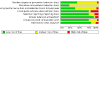

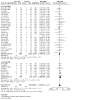
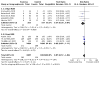
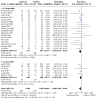
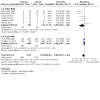
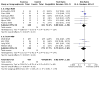

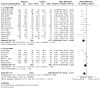
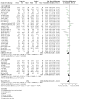
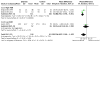
Update of
-
Exercise-based cardiac rehabilitation for adults with heart failure.Cochrane Database Syst Rev. 2019 Jan 29;1(1):CD003331. doi: 10.1002/14651858.CD003331.pub5. Cochrane Database Syst Rev. 2019. Update in: Cochrane Database Syst Rev. 2024 Mar 7;3:CD003331. doi: 10.1002/14651858.CD003331.pub6. PMID: 30695817 Free PMC article. Updated.
References
References to studies included in this review
Andryukhin 2010 {published data only}
-
- Andryukhin A, Frolova E, Vaes B, Degryse J. The impact of a nurse-led care programme on events and physical and psychosocial parameters in patients with heart failure with preserved ejection fraction: a randomized clinical trial in primary care in Russia. European Journal of General Practice 2010;16:205-14. [DOI: 10.3109/13814788.2010.527938] - DOI - PubMed
Antonicelli 2016 {published data only}
Austin 2005 {published data only}
-
- Austin J, Williams R, Ross L, Moseley L, Hutchison S. Randomised controlled trial of cardiac rehabilitation in elderly patients with heart failure. European Journal of Heart Failure 2005;7(3):411-7. - PubMed
-
- Austin J, Williams WR, Hutchison S. Multidisciplinary management of elderly patients with chronic heart failure: five year outcome measures in death and survivor groups. European Journal of Cardiovascular Nursing 2009;8(1):34-9. [PMID: ] - PubMed
-
- Austin J, Williams WR, Ross L, Hutchison S. Five-year follow-up findings from a randomized controlled trial of cardiac rehabilitation for heart failure. European Journal of Cardiovascular Prevention and Rehabilitation 2008;15(2):162-7. - PubMed
Belardinelli 1999 {published data only}
-
- Belardinelli R, Georgiou D, Cianci G, Purcaro A. Randomized, controlled trial of long-term moderate exercise training in chronic heart failure: effects on functional capacity, quality of life, and clinical outcome. Circulation 1999;99(9):1173-82. - PubMed
-
- Georgiou D, Chen Y, Appadoo S, Belardinelli R, Greene R, Parides MK, et al. Cost-effectiveness analysis of long-term moderate exercise training in chronic heart failure. American Journal of Cardiology 2001;87:984-8. - PubMed
Belardinelli 2012 {published data only}
-
- Belardinelli R, Georgiou D, Cianci G, Purcaro A. 10-year exercise training in chronic heart failure: a randomized controlled trial. Journal of the American College of Cardiology 2012;60:1521-8. - PubMed
Bocalini 2008 {published data only}
Chen 2018 {published data only}
-
- Chen Y, Funk M, Wen J, Tang X, He G, Liu H. Effectiveness of a multidisciplinary disease management program on outcomes in patients with heart failure in China: a randomized controlled single center study. Heart & Lung 2018;47(1):24-31. - PubMed
-
- Chen YY, Liu H, Funk M, Wen J, Tang XH, He GX. Effectiveness of disease management program on clinical outcomes in patients with heart failure in China. Journal of the American Geriatrics Society 2016;64:S369.
Cowie 2014 {published data only}
-
- Cowie A, Moseley O. Home- versus hospital-based exercise training in heart failure: an economic analysis. British Journal of Cardiology 2014;21(2):1-6.
-
- Cowie A, Thow MK, Granat MH, Mitchell SL. A comparison of home- and hospital-based exercise training in heart failure: immediate and long-term effects upon physical activity level. European Journal of Cardiovascular Prevention and Rehabilitation 2011;18:158-66. - PubMed
-
- Cowie A, Thow MK, Granat MH, Mitchell SL. Effects of home- versus hospital-based exercise training in chronic heart failure. International Journal of Cardiology 2012;158(2):295-98. - PubMed
Dalal 2018 {published and unpublished data}
-
- Dalal H, Taylor RS, Jolly K, Davis R, Doherty P, Miles J, et al. Facilitated self-care and rehabilitation for people with heart failure with reduced ejection fraction: the REACH-HF(Rehabilitation EnAblement in CHronic Heart Failure) multicentre randomised controlled trial. Manuscript submitted for publication (obtained from authors).
-
- Dalal HM, Taylor RS, Jolly K, Davis RC, Doherty P, Miles J, et al. The effects and costs of home-based rehabilitation for heart failure with reduced ejection fraction: the REACH-HF multicentre randomized controlled trial. European Journal of Preventive Cardiology 2019;26(3):262-72. [PMID: ] - PMC - PubMed
-
- Dalal HM, Taylor RS, Wingham J, Greaves CJ, Jolly K, Lang CC, et al. A facilitated home-based cardiac rehabilitation intervention for people with heart failure and their caregivers: a research programme including the REACH-HF RCT. Programme Grants for Applied Research 2021;9(1):1-205. [DOI: ] - PubMed
DANREHAB 2008 {published data only}
-
- Zwisler AD, Schou L, Soja AM, Brønnum-Hansen H, Gluud C, Iversen L, et al. A randomized clinical trial of hospital-based, comprehensive cardiac rehabilitation versus usual care for patients with congestive heart failure, ischemic heart disease, or high risk of ischemic heart disease (the DANREHAB trial) - design, intervention, and population. American Heart Journal 2005;899:e16. - PubMed
-
- Zwisler AD, Soja AM, Rasmussen S, Frederiksen M, Abedini S, Appel J, et al. Hospital-based comprehensive cardiac rehabilitation versus usual care among patients with congestive heart failure, ischemic heart disease, or high risk of ischemic heart disease: 12-month results of a randomized clinical trial. American Heart Journal 2008;155:1106-13. - PubMed
Davidson 2010 {published data only}
-
- Davidson PM, Cockburn J, Newton PJ, Webster JK, Betihavas V, Howes L, et al. Can a heart failure-specific cardiac rehabilitation program decrease hospitalizations and improve outcomes in high-risk patients? European Journal of Cardiovascular Prevention & Rehabilitation 2010;17:393-402. - PubMed
Dehkordi 2015 {published data only}
Dracup 2007 {published data only}
-
- Dracup K, Evangelista LS, Hamilton MA, Erickson V, Hage A, Moriguchi J, et al. Effects of a home-based exercise program on clinical outcomes in heart failure. American Heart Journal 2007;154(5):877-83. - PubMed
-
- Evangelista LS, Doering LV, Lennie T, Moser DK, Hamilton MA, Fonarow GC, et al. Usefulness of a home-based exercise program for overweight and obese patients with advanced heart failure. American Journal of Cardiology 2006;97(6):886-90. [PMID: ] - PubMed
Du 2018 {published data only}
-
- Du H, Newton PJ, Budhathoki C, Everett B, Salamonson Y, Macdonald PS, et al. The Home-Heart-Walk study: the effect of a self-administered walk test on perceived physical functioning and self-care behaviour in people with stable chronic heart failure: a randomized controlled trial. European Journal of Cardiovascular Nursing 2018;17:235-45. - PubMed
Gary 2010 {published data only}
Gary 2019 {published data only}
Giallauria 2008 {published data only}
-
- Giallauria F, Cirillo P, Lucci R, Pacileo M, De Lorenzo A, D'Agostino M, et al. Left ventricular remodelling in patients with moderate systolic dysfunction after myocardial infarction: favourable effects of exercise training and predictive role of N-terminal pro-brain natriuretic peptide. European Journal of Cardiovascular Prevention and Rehabilitation 2008;15(1):113-18. - PubMed
-
- Giallauria F, De Lorenzo A, Pilerci F, Manakos A, Lucci R, Psaroudaki M, et al. Reduction of N terminal-pro-brain (B-type) natriuretic peptide levels with exercise-based cardiac rehabilitation in patients with left ventricular dysfunction after myocardial infarction. European Society of Cardiology 2006;13(4):625-31. - PubMed
Giannuzzi 2003 {published data only}
-
- Giannuzzi P, Temporelli PL, Corra U, Tavazzi L. Antiremodeling effect of long-term exercise training in patients with stable chronic heart failure: results of the Exercise in Left Ventricular Dysfunction and Chronic Heart Failure (ELVD-CHF) trial. Circulation 2003;108(5):554-9. - PubMed
Gielen 2003 {published data only}
-
- Gielen S, Adams V, Mobius-Winkler S, Linke A, Erbs S, Yu J, et al. Anti-inflammatory effects of exercise training in the skeletal muscle of patients with chronic heart failure. Journal of the American College of Cardiology 2003;42(5):861-8. - PubMed
Gottlieb 1999 {published data only}
-
- Gottlieb SS, Fisher ML, Freudenberger R, Robinson S, Zietowski G, Alves L, et al. Effects of exercise training on peak performance and quality of life in congestive heart failure patients. Journal of Cardiac Failure 1999;5(3):188-94. - PubMed
Hagglund 2018 {published data only}
Hambrecht 1995 {published data only}
-
- Hambrecht R, Niebauer J, Fiehn E, Kalberer B, Offner B, Hauer K, et al. Physical training in patients with stable chronic heart failure: effects on cardiorespiratory fitness and ultrastructural abnormalities of leg muscles. Journal of the American College of Cardiology 1995;25(6):1239-49. - PubMed
Hambrecht 1998 {published data only}
-
- Hambrecht R, Fiehn E, Weigl C, Gielen S, Hamann C, Kaiser R, et al. Regular physical exercise corrects endothelial dysfunction and improves exercise capacity in patients with chronic heart failure. Circulation 1998;98(24):2709-15. - PubMed
Hambrecht 2000 {published data only}
-
- Hambrecht R, Gielen S, Linke A, Fiehn E, Yu J, Walther C, et al. Effects of exercise training on left ventricular function and peripheral resistance in patients with chronic heart failure: a randomized trial. JAMA 2000;283(23):3095-101. - PubMed
Hasanpour‐Dehkordi 2020 {published data only}
-
- Hassanpour Dehkordi A, Khaledi Far A. Effect of exercise training on dimensions of quality of life and fatigue in people with congestive heart failure class II and III: a randomized controlled trial. Indian Journal of Medical Specialities 29/01/2020;11(1):15-20. [DOI: 10.4103/INJMS.INJMS_43_19] - DOI
HF ACTION 2009 {published data only}
-
- Luo N, Merrill P, Whellan DJ, Pina IL, Fiuzat M, Kraus WE, et al. Exercise training in patients with chronic heart failure and atrial fibrillation: results from the HF-action trial. Journal of Cardiac Failure 2016;22:S71.
Hieda 2021 {published data only}
Jaarsma 2020 {published and unpublished data}
-
- Jaarsma T, Klompstra L, Ben Gal T, Ben Avraham B, Boyne J, Bäck M, et al. Effects of exergaming on exercise capacity in patients with heart failure: results of an international multicentre randomized controlled trial. European Journal of Heart Failure 2020;23:114-24. [DOI: 10.1002/ejhf.1754] [PMID: ] - DOI - PubMed
Jolly 2009 {published data only}
-
- Jolly K, Taylor RS, Lip GY, Davies M, Davis R, Mant J, et al. A randomized trial of the addition of home-based exercise to specialist heart failure nurse care: the Birmingham Rehabilitation Uptake Maximisation study for patients with Congestive Heart Failure (BRUM-CHF) study. European Journal of Heart Failure 2009;11:205-13. - PMC - PubMed
-
- Jolly K, Taylor RS, Lip GY, Greenfield SM, Davies MK, Davis RC, et al. Home based exercise rehabilitation in addition to specialist heart failure nurse care: design, rationale and recruitment to the Birmingham Rehabilitation Uptake Maximisation study for patients with congestive heart failure (BRUM-CHF): a randomised controlled trial. BMC Cardiovascular Disorders 2007;7:7-9. - PMC - PubMed
Jónsdóttir 2006 {published data only}
-
- Jónsdóttir S, Andersen KK, Sigurðsson AF, Sigurðsson SB. The effect of physical training in chronic heart failure. European Journal of Heart Failure 2006;8(1):97-101. - PubMed
Kaltsatou 2014 {published data only}
-
- Kalsatou AC, Kouidi EI, Anifanti MA, Douka SI, Deligiannis AP. Functional and psychosocial effects of either a traditional dancing or a formal exercising training program in patients with chronic heart failure: a comparative randomized controlled study. Clinical Rehabilitation 2014;28(2):128-38. - PubMed
Keteyian 1996 {published data only}
-
- Keteyian SJ, Levine AB, Brawner CA, Kataoka T, Rogers FJ, Schairer JR, et al. Exercise training in patients with heart failure. A randomized, controlled trial. Annals of Internal Medicine 1996;124(12):1051-7. - PubMed
Kitzman 2021 {published data only}
Klecha 2007 {published data only}
-
- Klecha A, Kawecka-Jaszcz K, Bacior B, Kubinyi A, Pasowicz M, Klimeczek P, et al. Physical training in patients with chronic heart failure of ischemic origin: effect on exercise capacity and left ventricular remodeling. European Journal of Cardiovascular Prevention and Rehabilitation 2007;14(1):85-91. - PubMed
Klocek 2005 {published data only}
-
- Klocek M, Kubinyi A, Bacior B, Kawecka-Jaszcz K. Effect of physical training on quality of life and oxygen consumption in patients with congestive heart failure. International Journal of Cardiology 2005;103(1):323-9. - PubMed
Koukouvou 2004 {published data only}
-
- Koukouvou G, Kouidi E, Iacovides A, Konstantinidou E, Kaprinis G, Deligiannis A. Quality of life, psychological and physiological changes following exercise training in patients with chronic heart failure. Journal of Rehabilitation Medicine 2004;36:36-41. - PubMed
Lang 2018 {published data only}57596739
-
- Eyre V, Lang CC, Smith K, Jolly K, Davis R, Hayward C, et al. Rehabilitation Enablement in Chronic Heart Failure - a facilitated self-care rehabilitation intervention in patients with heart failure with preserved ejection fraction (REACH-HFpEF) and their caregivers: rationale and protocol for a single-centre pilot randomised controlled trial. BMJ Open 2016;6:e012853. - PMC - PubMed
-
- Lang CC, Smith K, Wingham J, Eyre V, Greaves C, Warren FC, et al. A randomised controlled trial of a facilitated home-based rehabilitation intervention in patients with heart failure with preserved ejection fraction and their caregivers: REACH-HFpEF pilot study. BMJ Open 2018;8(4):e019649. - PMC - PubMed
Liu 2018 {published data only}
-
- Liu MH, Wang CH, Tung TH, Kuo LT, Chiou AF. Effects of a multidisciplinary disease management programme with or without exercise training for heart failure patients: secondary analysis of a randomized controlled trial. International Journal of Nursing Studies 2018;87:94-102. [PMID: ] - PubMed
-
- Mao CT, Liu M-H, Hsu K-H, Fu T-C, Wang J-S, Huang Y-Y, et al. Effect of multidisciplinary disease management for hospitalized heart failure under a national health insurance programme. Journal of Cardiovascular Medicine 2015;16(9):616-24. - PubMed
Lugo 2018 {published data only}
-
- Lugo HL, Navas CM, Plata JA, Ortiz SD, Caraballo D, Henao AC, et al. A randomised clinical trial to evaluate the effect of a supervised rehabilitation program with exercise on oxygen consumption, function, and quality of life of patients with chronic heart failure [Ensayo clínico aleatorizado para evaluar el efecto de un programa de rehabilitación cardiaca supervisado con ejercicio en el consumo de oxígeno, la función y calidad de vida de pacientes con falla cardiaca crónica]. Revista Colombiana de Cardiología 2017;25(2):106-15. [DOI: ]
McKelvie 2002 {published data only}
-
- McKelvie RS, Teo KK, Roberts R, McCartney N, Humen D, Montague T, et al. Effects of exercise training in patients with heart failure: the Exercise Rehabilitation Trial (EXERT). American Heart Journal 2002;144(1):23-30. - PubMed
Mehani 2013 {published data only}
Mueller 2007 {published data only}
-
- Mueller L, Myers J, Kottman W, Oswald U, Boesch C, Arbrol N, et al. Exercise capacity, physical activity patterns and outcomes six years after cardiac rehabilitation in patients with heart failure. Clinical Rehabilitation 2007;21(10):923-31. - PubMed
Mueller 2021 {published data only}
-
- Mueller S, Winzer EB, Duvinage A, Gevaert AB, Edelmann F, Haller B, et al. Effect of high-intensity interval training, moderate continuous training, or guideline-based physical activity advice on peak oxygen consumption in patients with heart failure with preserved ejection fraction: a randomized clinical trial. JAMA 2021;325(6):542-51. [PMID: ] - PMC - PubMed
Myers 2000 {published data only}
-
- Myers J, Goebbels U, Dzeikan G, Froelicher V, Bremerich J, Mueller P, et al. Exercise training and myocardial remodeling in patients with reduced ventricular function: one-year follow-up with magnetic resonance imaging. American Heart Journal 2000;139(2 Pt 1):252-61. [PMID: ] - PubMed
Nilsson 2008 {published data only}
-
- Nilsson BB, Westheim A, Risberg MA. Long-term effects of a group-based high-intensity aerobic interval-training program in patients with chronic heart failure. American Journal of Cardiology 2008;102:1220-4. - PubMed
Norman 2012 {published data only}
Passino 2006 {published data only}
-
- Passino C, Severino S, Poletti R, Piepoli MF, Mammini C, Clerico A, et al. Aerobic training decreases B-type natriuretic peptide expression and adrenergic activation in patients with heart failure. Journal of the American College of Cardiology 2006;47:1835-9. - PubMed
Peng 2018 {published data only}
Pozehl 2008 {published data only}
-
- Pozehl B, Duncan K, Hertzog M. The effects of exercise training on fatigue and dyspnea in heart failure. European Journal of Cardiovascular Nursing 2008;7(2):127-32. - PubMed
Reeves 2017 {published data only}
Ricca‐Mallada 2017 {published data only}
-
- Ricca-Mallada R, Migliaro ER, Silvera G, Chiappella L, Frattini R, Ferrando-Castagnetto F. Functional outcome in chronic heart failure after exercise training: possible predictive value of heart rate variability. Annals of Physical and Rehabilitation Medicine 2017;60(2):87-94. [DOI: 10.1016/j.rehab.2016.12.003] [PMID: ] - DOI - PubMed
Ryu 2018 {published data only}
-
- Ryu HY, Kim KS, Jeon IC. Influence of home based exercise intensity on the aerobic capacity and 1 year re-hospitalization rate in patients with chronic heart failure. Journal of Korean Physical Therapy 2018;30(5):181-6. [DOI: ]
Santa‐Clara 2019 {published data only}
-
- Santa-Clara H, Abreu A, Melo X, Santos V, Cunha P, Oliveira M, et al. High‑intensity interval training in cardiac resynchronization therapy: a randomized control trial. European Journal of Applied Physiology 2019;119:1757-67. [DOI: ] - PubMed
TELEREH‐HF 2020 {published data only}
-
- Główczyńska R, Piotrowicz E, Szalewska D, Piotrowicz R, Kowalik I, Pencina MJ, et al. Efects of hybrid comprehensive telerehabilitation on cardiopulmonary capacity in heart failure patients depending on diabetes mellitus: subanalysis of the TELEREH-HF randomized clinical trial. Cardiovasular Diabetology 2021;20:106. [PMID: ] - PMC - PubMed
-
- Niewada M, Tabor B, Piotrowicz E, Piotrowicz R, Opolski G, Banach M, et al. Cost-effectiveness of telerehabilitation in patients with heart failure in Poland: an analysis based on the results of Telerehabilitation in the Heart Failure Patients (TELEREH-HF) randomized clinical trial. Kardiologia Polska 2021;79(5):510-6. [PMID: ] - PubMed
-
- Orzechowski P, Piotrowicz R, Zareba W, Pencina MJ, Kowalik I, Komar E, et al. Antiarrhythmic effect of 9-week hybrid comprehensive telerehabilitation and its influence on cardiovascular mortality in long-term follow-up - subanalysis of the TELEREHabilitation in Heart Failure Patients randomized clinical trial. Archives of Medical Science 2021;18(2):293-306. [PMID: ] - PMC - PubMed
-
- Piotrowicz E, Pencina MJ, Opolski G, Zareba W, Banach M, Kowalik I, et al. Antiarrhythmic effect of 9-week hybrid comprehensive telerehabilitation and its influence on cardiovascular mortality in long-term follow-up – subanalysis of the TELEREHabilitation in Heart Failure Patients randomized clinical trial. Archives of Medical Science 2021;18(2):293-306. [PMID: ] - PMC - PubMed
-
- Piotrowicz E, Pencina MJ, Opolski G, Zareba W, Banach M, Kowalik I, et al. Effects of a 9-week hybrid comprehensive telerehabilitation program on long-term outcomes in patients with heart failure the Telerehabilitation in Heart Failure Patients (TELEREH-HF) randomized clinical trial. JAMA Cardiology 2019;5(3):300-8. [PMID: ] - PMC - PubMed
Wall 2010 {published data only}
-
- Wall HK, Ballard J, Troped P, Njike VY, Katz DL. Impact of home-based, supervised exercise on congestive heart failure. International Journal of Cardiology 2010;145:267-70. - PubMed
Wang 2021 {published data only}PMC8290646
Willenheimer 2001 {published data only}
-
- Willenheimer R, Rydberg E, Cline C, Broms K, Hillberger B, Oberg L, et al. Effects on quality of life, symptoms and daily activity 6 months after termination of an exercise training programme in heart failure patients. International Journal of Cardiology 2001;77(1):25-31. - PubMed
Witham 2005 {published data only}
-
- Witham MD, Gray JM, Argo IS, Johnston DW, Struthers AD, McMurdo ME. Effect of a seated exercise program to improve physical function and health status in frail patients > or = 70 years of age with heart failure. American Journal of Cardiology 2005;95(9):1120-4. [PMID: ] - PubMed
Witham 2012 {published data only}
-
- Witham MD, Fulton RL, Greig CA, Johnston DW, Lang CC, Van der Pol M, et al. Efficacy and cost of an exercise program for functionally impaired older patients with heart failure: a randomized controlled trial. Circulation: Heart Failure 2012;5:209-16. - PubMed
References to studies excluded from this review
Abdelbasset 2019 {published data only}
Abolahrari‐Shirazi 2018 {published data only}
Alonso 2021 {published data only}
-
- Windy W, Alonso KA, Kupzyk JF, Norman SW, Lundgren AF. The HEART The HEART Camp Exercise Intervention improves exercise adherence, physical function, and patient-reported outcomes in adults with preserved ejection fraction heart failure. Journal of Cardiac Failure 2021;28(3):431-42. [DOI: ] - PMC - PubMed
Arjunan 2020 {published data only}
Ayad 2021 {published data only}
-
- Ayad S, Hassanein M, El Dabe F, El Amrawy A. Impact of cardiac rehabilitation on patients with heart failure with preserved ejection fraction. JACC 2021;77(18):574.
Bahrami 2019 {published data only}
-
- Bahrami H, Homaei H, Maleki M, Naderi N. Study design: The effects of photobiomodulation therapy combined with exercise training on functional capacity and quality of life in patients with heart failure (double-blind randomized). Research in Cardiovascular Medicine Journal of the American College of Cardiology;8(4):114-7. [DOI: 10.4103/rcm.rcm_27_19] - DOI
Bangen 2020 {published data only}
-
- Redwine LS, Pung MA, Wilson K, Bangen KJ, Delano-Wood L, Hurwitz B. An exploratory randomized sub-study of light-to-moderate intensity exercise on cognitive function, depression symptoms and inflammation in older adults with heart failure. Journal of Psychosomatic Research 2020;128:109883. [PMID: ] - PMC - PubMed
Bortzova 2018 {published data only}
-
- Bortsova M, Sitnikova M, Demchenko E, Lelyavina T, Babich O, Galenko V, et al. Efficiency and safety of physical rehabilitation in patients with chronic heart failure III-IV class NYHA candidates for heart transplantation. European Journal of Heart Failure 2018;20:86. [DOI: 10.1002/ejhf.1197] - DOI
Brubaker 2020 {published data only}
-
- Brubaker PH, Avis T, Rejeski WJ, Mihalko SE, Tucker WJ, Kitzman DW. Exercise training effects on the relationship of physical function and health-related quality of life among older heart failure patients with preserved ejection fraction. Journal of Cardiopulmonary Rehabilitation and Prevention 2020;40(6):427-33. [PMID: ] - PMC - PubMed
Chaveles 2021 {published data only}
Chen 2017 {published data only}
-
- Chen DM, Yu WC, Hung HF, Tsai JC, Wu HY, Chiou AF. The effects of Baduanjin exercise on fatigue and quality of life in patients with heart failure: a randomized controlled trial. European Journal of Cardiovascular Nursing 2018;17(5):456-66. [PMID: ] - PubMed
Chinh 2019 {published data only}
-
- Redwine LS, Wilson K, Pung MA, Chinh K, Rutledge T, Mills PJ, Smith B. A randomized study examining the effects of mild-to-moderate group exercises on cardiovascular, physical, and psychological well-being in patients with heart failure. Journal of Cardiopulmonary Rehabilitation and Prevention 2019;39(6):403-8. [PMID: ] - PMC - PubMed
Davis 2018 {published data only}
Deka 2019 {published data only}
-
- Deka P, Pozehl B, Williams MA, Norman JF, Khazanchi D, Pathak D. MOVE-HF: an internet-based pilot study to improve adherence to exercise in patients with heart failure. European Journal of Cardiovascular Nursing 2019;18(2):122-31. [PMID: ] - PubMed
Delgado 2020 {published data only}
-
- Delgado BM, Lopes I, Gomes B, Novo A. Early rehabilitation in cardiology – heart failure: The ERIC-HF protocol, a novel intervention to decompensated heart failure patients rehabilitation. European Journal of Cardiovascular Nursing 2020;19(7):592–9. [DOI: ] - PubMed
Deng 2020 {published data only}
-
- Deng H. One-dimensional nanomaterials on prognosis and sports rehabilitation of elderly patients with chronic heart failure. Ferroelectrics 2021;580(1):298-301. [DOI: ]
Galenko 2018a {published data only}
-
- Galenko VL, Lelyavina TA, Sitnikova MY. P2178 Non-response predictors to physical rehabilitation in heart failure patients. European Journal of Heart Failure 2018;20 Suppl 1:582.
Galenko 2018b {published data only}
-
- Galenko VL, Lelyavina TA, Sitnikova MY. P2180 Physical rehabilitation efficiency in heart failure patients. European Journal of Heart Failure 2018;20 Suppl 1:583. [DOI: 10.1002/ejhf.1197] - DOI
Gary 2020 {published data only}
Gasser 2021 {published data only}
-
- Gasser B, Boesing M, Schoch R, Brighenti-Zogg S, Kröpfl J, Thesenvitz E, et al. High-intensity interval training for heart failure patients with preserved ejection fraction (HIT-HF)-rational and design of a prospective, randomized, controlled trial. Frontiers in Physiology 2021;12:734111. [PMID: ] - PMC - PubMed
Gevaert 2021 {published data only}
-
- Gevaert AB, Witvrouwen I, Van Craenenbroeck AH, Van Laere SJ, Boen JR, Van de Heyning CM, et al. miR-181c level predicts response to exercise training in patients with heart failure and preserved ejection fraction: an analysis of the OptimEx-Clin trial. European Journal of Preventive Cardiology 2021;28(15):1722-33. [PMID: ] - PubMed
Guimaraes 2018 {published data only}
-
- Guimaraes GV, Alves LS, Sara MG, Chizzola PR, Castro RE, Bocchi EA. P6236 Permanent atrial fibrillation in heart failure: impact of exercise training on biomarkers. A randomized controlled trial. European Heart Journal 2018;39 Suppl 1:2018.
Guimaraes 2021 {published data only}
-
- Guimarães GV, Ribeiro F, Castro RE, Roque JM, Machado ADT, Antunes-Correa LM, et al. Effects of the exercise training on skeletal muscle oxygen consumption in heart failure patients with reduced ejection fraction. International Journal of Cardiology 2021;343:73-9. [PMID: ] - PubMed
Guo 2018 {published data only}
-
- Guo D. Improvement of cardiac function and quality of life in elderly patients with chronic heart failure by exercise rehabilitation. Journal of the American Geriatrics Society 2018;66:S511. [DOI: 10.1111/jgs.15550] - DOI
Halle 2018 {published data only}
-
- Halle M, Prescott E, Linke A, Ellingsen Ø. Exercise training of different intensities in heart failure with ischemic and non-ischemic etiology -results from the smartex trial. Circulation 2018;138 Suppl 1:A12099.
Hearon 2020 {published data only}
-
- Hearon CM Jr, Dias KA, Samels M, Morris M, Palmer D, Livingston SA, et al. Effects of 1-year of high intensity interval training and omega-3 fatty acid supplementation in stage A HFpEF: A randomized controlled trial. Circulation 2020;142 Suppl 3:A14518.
Hieda 2019 {published data only}
-
- Hieda M, Hearon CM Jr, Dias KA, Rakushumimarika H, Yogamaya M, MacNamara JP, et al. Effect of stage B HFpEF on diastolic peak filling rates in obese individuals, and the impact of 1 year of exercise training. Circulation 2019;140 Suppl 1:A10958. [DOI: 10.1161/circ.140.suppl_1.10958] - DOI
Hooglugt 2018 {published data only}
-
- Hooglugt JQ, Van Dissel AC, De Haan FH, Blok IM, Jorstad HR, Mulder BJ, et al. Efficacy and compliance of long-term, individualised exercise training in adults with congenital heart disease and heart failure symptoms: a randomized controlled trial. European Heart Journal 2018;39:245. [DOI: 10.1093/eurheartj/ehy565.P1240] - DOI
Hu 2021 {published data only}
-
- Hu T, Xiong H, Zhou H, Song Y, Zhang Z, Wan J, et al. Effect of acupoint meridian therapeutic exercise on cardiac function in patients with chronic heart failure. Acupuncture & Electro-Therapeutics Research 2021;46(3):177-89. [DOI: ]
Hua 2019 {published data only}
-
- Yin H, Tan C, Li X, Wang J, Wu Z. Effects of continuous weight intervention on cardiac function and quality of life in chronic congestive heart failure. Chinese Nursing Research 2019;33(6):911-6. [DOI: 10.12102/j.issn.1009-6493.2019.06.001] - DOI
Jin 2016 {published data only}
-
- Jin H, Lee H. The effects of reinforced walking exercise on dyspnea-fatigue symptoms, daily activities, walking ability, and health related quality of life in heart failure patients. Korean Journal of Adult Nursing 2016;28(3):266-78. [DOI: ]
Jones 2019 {published data only}
Karaman 2020 {published data only}
-
- Karaman E, Fadiloglu C, Yildirim Y, Zoghi M, Sahin YG, Aykar FS. The effects of an exercise empowerment programme for older patients with heart failure: a randomized controlled trial. International Journal of Caring Sciences 2020;13(3):1835.
Kim 2016 {published data only}
Lan 2020 {published data only}
-
- Lan NS, Lam K, Naylor LH, Green DJ, Minaee NS, Dias P, Maiorana AJ. The impact of distinct exercise training modalities on echocardiographic measurements in patients with heart failure with reduced ejection fraction. Journal of the American Society of Echocardiography 2020 ;33(2):148-56. [PMID: ] - PubMed
Li 2020 {published data only}
Limpens 2021 {published data only}
Mendes 2020 {published data only}
Mudge 2011 {published data only}
-
- Mudge AM, Denaro CP, Scott AC, Atherton JJ, Meyers DE, Marwick TH, et al. Addition of supervised exercise training to a post-hospital disease management program for patients recently hospitalized with acute heart failure: the EJECTION-HF randomized phase 4 trial. JACC: Heart Failure 2018;6(2):143-52. - PubMed
-
- Mudge AM, Denaro CP, Scott AC, Atherton JJ, Meyers DE, Marwick TH, et al. Exercise training in recently hospitalized heart failure patients enrolled in a disease management programme: design of the EJECTION-HF randomized controlled trial. European Journal of Heart Failure 2011;13:1370-5. - PubMed
Mudge 2018 {published data only}
-
- Mudge AM, Denaro CP, Scott AC, Meyers D, Adsett JA, Mullins RW, et al. Addition of supervised exercise training to a post-hospital disease management program for patients recently hospitalized with acute heart failure: The EJECTION-HF Randomized Phase 4 Trial. JACC Heart Failure 2018;6(2):143-52. [PMID: ] - PubMed
Murad 2019 {published data only}
-
- Murad S, Siddiqi FA, Tariq MI, Butt MW. Effects of cardiovascular conditioning exercises on quality of life in patients with dilated ardiomyopathy in Pakistan. Journal of Ayub Medical College Abbottabad 2019;31:S651-5. [PMID: ] - PubMed
Nakaya 2021 {published data only}
-
- Nakaya Y, Akamatsu M, Ogimoto A, Kitaoka H. Early cardiac rehabilitation for acute decompensated heart failure safely improves physical function (PEARL study): a randomized controlled trial. European Journal of Physics 2021;57(6):985-93. [PMID: ] - PubMed
Ngengo 2020 {published data only}
-
- Ngeno GT, Barasa FA, Kwobah E, Kamano J, Vedanthan R, Knettel B, et al. Outcomes of a randomized controlled trial of integrated cardiac rehabilitation among heart failure patients in Kenya. Circulation 2020;142:A16597. [DOI: ]
Norman 2020 {published data only}
-
- Norman JF, Kupzyk KA, Artinian NT, Keteyian SJ, Alonso WS, Bills SE, et al. The influence of the HEART Camp intervention on physical function, health-related quality of life, depression, anxiety and fatigue in patients with heart failure. European Journal of Cardiovascular Nursing 2020;19(1):64-73. [PMID: ] - PMC - PubMed
Omidi 2020 {published data only}
-
- Omidi S, Delavar SH, Amiripour A, Heydarpoor B. Effects of eight weeks of aerobic exercises on the cardiac function and inflammatory markers of male patients with heart failure after coronary artery bypass grafting. Journal of Kermanshah University of Medical Sciences 2020;24(1):e98429. [DOI: 10.5812/jkums.98429] - DOI
Orwelius 2020 {published data only}
-
- Orwelius L, Jaarsma T, Klompstra L, Thylen I, Stromberg A. Evaluate efficacy of tele-yoga on multiple outcomes after a period of critical illness. Intensive Care Medicine Experimental 2020;8 Suppl 2. [DOI: 10.1186/s40635-020-00354-8] - DOI
Papathanasiou 2017 {published data only}
-
- Papathanasiou J, Boyadjiev N, Dimitrova D, Kasnakova P, Tsakris Z, Tsekoura D, et al. The effect of group-based cardiac rehabilitation models on the quality of life and exercise capacity of patients with chronic heart failure. Hellenic Journal of Cardiology 2017;58(6):432-5. [PMID: ] - PubMed
Papathanasiou 2020 {published data only}
Pourhabib 2018 {published data only}
-
- Pourhabib A, Fotokian Z, Nasiri M, Abrotan S. Effects of a group-based aerobic and resistance exercise program on physiological-psychological adaptation in elderly with heart failure. Journal of Clinical Gerontology & Geriatrics 2018;9(1):59-66.
Pourhabib 2019 {published data only}
-
- Pourhabib A, Fotokian Z. Effects of aerobic and resistance exercise program on physical adaptation in the elderly men patients with heart failure. Journal of Shahid Sadoughi University of Medical Sciences 2019;27(7):0. [DOI: ]
Pozehl 2018 {published data only}
Sayegh 2019 {published data only}
-
- Sayegh AL, Dos Santos MR, Rondon E, Oliveira P, Souza FR, Salemi VM, et al. Exercise rehabilitation improves cardiac volumes and functional capacity in patients with endomyocardial fibrosis: a randomized controlled trial. Journal of Cardiopulmonary Rehabilitation and Prevention 2019;39(6):373-80. [PMID: ] - PubMed
Scuffham 2019 {published data only}
-
- Maru S, Mudge AM, Suna JM, Scuffham PA. One-year cost-effectiveness of supervised center-based exercise training in addition to a post-discharge disease management program for patients recently hospitalized with acute heart failure: The EJECTION-HF study. Heart & Lung 2019;48(5):414-20. [PMID: ] - PubMed
Sengupta 2021 {published data only}
-
- Sengupta SP, Masram S, Sawarkar S, Okwose NC, Macgowan GA, Jakovljevic DG. Haemodynamic effects of a personalized, home-based physical activity intervention for heart failure with preserved ejection fraction. European Journal of Heart Failure 2021;23 Suppl 2:25-6. [DOI: 10.1002/ejhf.2297] - DOI
Sinikova 2019 {published data only}
-
- Леляϑина T, Sinikova M, Galenko V. Predictors of reverse myocardial remodeling in heart failure patients undergoing aerobic exercise, designed with individualized method based on lactate threshold definition. Chest 2019;155(6, Supplement):A340.
Smyrnova 2018 {published data only}
-
- Smyrnova G, Babkina T, Taradin G, Vatutin M. Influence of pulmonary rehabilitation on clinical characteristics in patients with chronic heart failure and chronic obstructive pulmonary disease. International Journal of Cardiovascular Sciences 2018;31(5):499-504. [DOI: 10.5935/2359-4802.20180051] - DOI
Song 2019 {published data only}
Spee 2020 {published data only}
-
- Spee RF, Niemeijer VM, Schoots T, Tuinenburg A, Houthuizen P, Wijn PF, et al. High intensity interval training after cardiac resynchronization therapy: an explorative randomized controlled trial. International Journal of Cardiology 2020;299:169-74. [PMID: ] - PubMed
Turri‐Silva 2021 {published data only}
-
- Turri-Silva N, Vale-Lira A, Verboven K, Quaglioti Durigan JL, Hansen D, Cipriano G Jr. High-intensity interval training versus progressive high-intensity circuit resistance training on endothelial function and cardiorespiratory fitness in heart failure: a preliminary randomized controlled trial. PLoS One 2021;16(10):e0257607. [PMID: ] - PMC - PubMed
Yu 2020 {published data only}
-
- Yu J, Wang M, Fang J, Lin Z. The effects of cardiac exercise rehabilitation training on the cardiopulmonary function and quality of life in patients with chronic stable heart failure. International Journal of Clinical and Experimental Medicine 2020;13(8):5983-90.
Zhang 2021 {published data only}
-
- Zhang ZY, Sun XG, Xi JN, Feng J, Sun XJ, Liu YL. The impacts of outpatient vs inpatient holistic management based on exercise training on cardiac rehabilitation efficacy among patients with chronic heart failure. Zhongguo Ying Yong Sheng Li Xue Za Zhi 2021;37(1):89-95. [PMID: ] - PubMed
References to ongoing studies
Bobenko 2019 {published data only}
-
- Bobenko A, Schoenrath F, Knierim JH, Friede T, Verheyen N, Mehra MR, et al. Exercise training in patients with a left ventricular assist device (Ex-VAD): rationale and design of a multicentre, prospective, assessor-blinded, randomized, controlled trial. European Journal of Heart Failure 2019;21(9):1152-59. [PMID: ] - PubMed
Koifman 2014 {published data only}
-
- Koifman E, Grossman E, Elis A, Dicker D, Koifman B, Mosseri M, et al. Multidisciplinary rehabilitation program in recently hospitalized patients with heart failure and preserved ejection fraction: rationale and design of a randomized controlled trial. American Heart Journal 2014;168(6):830-7. - PubMed
Vetrovsky 2017 {published data only}
-
- Vetrovsky T, Siranec M, Parenica J, Griva M, Stastny J, Precek J, et al. Effect of a 6-month pedometer-based walking intervention on functional capacity in patients with chronic heart failure with reduced (HFrEF) and with preserved (HFpEF) ejection fraction: study protocol for two multicenter randomized controlled trials. Journal of Translational Medicine 2017;15:153. - PMC - PubMed
Zuazagoitia 2010 {published data only}
-
- Zuazagoitia A, Grandes G, Torcal J, Lekuona I, Echevarria P, Gómez MA, et al. Rationale and design of a randomised controlled trial evaluating the effectiveness of an exercise program to improve the quality of life of patients with HF in primary care: the EFICAR study protocol. BMC Public Health 2010;10:33. - PMC - PubMed
Additional references
ACCF/AHA 2013
-
- Yancy CW, Jessup M, Bozkurt B, Butler J, Casey DE Jr, Drazner MH, et al. 2013 ACCF/AHA guideline for the management of heart failure: a report of the American College of Cardiology Foundation/American Heart Association Task Force on Practice Guidelines. Journal of the American College of Cardiology 2013;15:e147-239. - PubMed
AHA/ACC/HFSA 2022
-
- Heidenreich PA, Bozkurt B, Aguilar D, Allen LA, Byun JJ, Colvin MM, et al. 2022 AHA/ACC/HFSA Guideline for the Management of Heart Failure: A report of the American College of Cardiology/American Heart Association Joint Committee on Clinical Practice Guidelines. Circulation 2022;145(18):e895–e1032. [DOI: ] - PubMed
Anker 2021
-
- Anker SD, Butler J, Filippatos G, Ferreira JP, Bocchi E, Böhm M, et al. EMPEROR-Preserved Trial Investigators. Empagliflozin in heart failure with a preserved ejection fraction. New England Journal of Medicine 2021;14:1451-61.
BACPR 2017
-
- British Association for Cardiovascular Prevention and Rehabilitation (BACPR). The BACPR standards and core components for cardiovascular disease prevention and rehabilitation, 3rd edition, 2017. http://www.bacpr.com/resources/6A7_BACR_Standards_and_Core_Components_20... (accessed 2 May 2018).
Belardinelli 1998
-
- Belardinelli R, Georgiou D, Ginzton L, Cianci G, Purcaro A. Effects of moderate exercise training on thallium uptake and contractile response to low-dose dobutamine of dysfunctional myocardium in patients with ischemic cardiomyopathy. Circulation 1998;97:553-61. - PubMed
Bjarnason‐Wehrens 2010
-
- Bjarnason-Wehrens B, McGee H, Zwisler AD. Cardiac rehabilitation in Europe: results from the European Cardiac Rehabilitation Inventory Survey. European Journal of Cardiovascular Prevention and Rehabilitation 2010;17:410-8. - PubMed
Bjarnason‐Wehrens 2020
-
- Bjarnason-Wehrens B, Nebel R, Jensen K, Hackbusch M, Grilli M, Gielen S, et al. German Society of Cardiovascular Prevention and Rehabilitation (DGPR). Exercise-based cardiac rehabilitation in patients with reduced left ventricular ejection fraction: The Cardiac Rehabilitation Outcome Study in Heart Failure (CROS-HF): a systematic review and meta-analysis. European Journal of Preventive Cardiology 2020;27:929-52. - PMC - PubMed
Braunwald 2015
-
- Braunwald E. The war against heart failure: the Lancet lecture. Lancet 2015;385:812-24. - PubMed
Calvert 2007
-
- Calvert MJ, Freemantle N, Cleland JG. The impact of chronic heart failure on health-related quality of life data acquired in the baseline phase of the CARE-HF study. European Journal of Heart Failure 2007;7:243-51. - PubMed
Chan 2016
-
- Chan E, Giallauria F, Vigorito C, Smart NA. Exercise training in heart failure patients with preserved ejection fraction: a systematic review and meta-analysis. Monaldi Archives for Chest Disease 2016;86:759. - PubMed
Conrad 2018
Corra 2005
-
- Corra U, Giannuzzia P, Adamopoulos S, Bjornstad Bjarnason-Wehernsd HB, Cohen-Solale A, Dugmore D, et al. Executive summary of the position paper of the Working Group on Cardiac Rehabilitation and Exercise Physiology of the European Society of Cardiology (ESC): core components of cardiac rehabilitation in chronic heart failure. European Journal of Cardiovascular Prevention and Rehabilitation 2005;12:32-105. - PubMed
Cowie 2019
Dalal 2021
Dallas Heart Study 2017
-
- Garg S, Lemos JA, Matulevicius SA, Ayers C, Pandey A, Neeland IJ, et al. Association of concentric left ventricular hypertrophy with subsequent change in left ventricular end-diastolic volume: the Dallas Heart Study. Circulation. Heart Failure 2017;10:e003959. [DOI: 10.1161/CIRCHEARTFAILURE.117.003959] - DOI - PubMed
Deeks 2022
-
- Deeks JJ, Higgins JP, Altman DG editor(s). Chapter 10: Analysing data and undertaking meta-analyses. In: Higgins JP, Thomas J, Chandler J, Cumpston M, Li T, Page MJ, Welch VA editor(s). Cochrane Handbook for Systematic Reviews of Interventions Version 6.3 (updated February 2022). Cochrane, 2022. https://training.cochrane.org/handbook/archive/v6.3/chapter-10.
Dunley 2017
-
- Dunley SM, Roger VL, Redfield MM. Epidemiology of heart failure with preserved ejection fraction. Nature Reviews Cardiology 2017;14:591-602. - PubMed
Egger 1997
ESC 2021
-
- McDonagh TA, Metra M, Adamo M, Gardner RS, Baumbach A, Böhm M, et al. ESC Scientific Document Group. 2021 ESC Guidelines for the diagnosis and treatment of acute and chronic heart failure. European Heart Journal 2021;43:3599-726.
Evangelista 2010
ExTraMatch 2004
ExTraMATCH II
-
- Taylor RS, Walker S, Smart NA, Piepoli MF, Warren FC, Ciani O, et al. Impact of exercise-based cardiac rehabilitation in patients with heart failure (ExTraMATCHII) on mortality and hospitalisation: an individual patient data meta-analysis of randomised trials. European Journal of Heart Failure 2018;1311:[Epub ahead of print]. - PMC - PubMed
Gajjela 2021
GBD 2017
-
- GBD 2017. Disease and Injury Incidence and Prevalence Collaborators. Global, regional, and national incidence, prevalence, and years lived with disability for 354 diseases and injuries for 195 countries and territories, 1990-2017: a systematic analysis for the Global Burden of Disease Study 2017. Lancet 2018;392:1789–858. - PMC - PubMed
Georgiou 2001
-
- Georgiou D, Chen Y, Appadoo S, Belardinelli R, Greene R, Parides MK, et al. Cost-effectiveness analysis of long-term moderate exercise training in chronic heart failure. American Journal of Cardiology 2001;87:984-8. - PubMed
Golwala 2015
-
- Golwala H, Pandey A, Ju C, Butler J, Yancy C, Bhatt DL, et al. Temporal trends and factors associated with cardiac rehabilitation referral among patients hospitalized with heart failure: findings from Get With the Guidelines - Heart Failure Registry. Journal of the American College of Cardiology 2015;66:917-26. - PubMed
Gonzalez‐Saenz 2019
Haykowsky 2007
-
- Haykowsky MJ, Liang Y, Pechter D, Jones LW, McAlister FA, Clark AM. A meta-analysis of the effect of exercise training on left ventricular remodeling in heart failure patients: the benefit depends on the type of training performed. Journal of the American College of Cardiology 2007;49(24):2329-36. [PMID: ] - PubMed
Heran 2011
Higgins 2003
Higgins 2011
-
- Higgins JP, Altman DG, Sterne JA (editors). Chapter 8: Assessing risk of bias in included studies. In: Higgins JP, Green S (editors). Cochrane Handbook for Systematic Reviews of Interventions Version 5.1.0 (updated March 2011). The Cochrane Collaboration, 2011. https://training.cochrane.org/handbook/archive/v5.1/.
Higgins 2022
-
- Higgins JP, Li T, Deeks JJ editor(s). Chapter 6: Choosing effect measures and computing estimates of effect. In: Higgins JP, Thomas J, Chandler J, Cumpston M, Li T, Page MJ, Welch VA editor(s). Cochrane Handbook for Systematic Reviews of Interventions Version 6.3 (updated February 2022). Cochrane, 2022. https://training.cochrane.org/handbook/archive/v6.3/chapter-06.
Holland 2011
-
- Holland DJ, Kumbhani DJ, Ahmed SH, Marwick TH. Effects of treatment on exercise tolerance, cardiac function, and mortality in heart failure with preserved ejection fraction. A meta-analysis. Journal of the American College of Cardiology 2011;19:1676-86. - PubMed
Karmali 2014
Keteyian 2012
Komajda 2017
-
- Komajda M, Isnard R, Cohen-Solal A, Metra M, Pieske B, Ponikowski P, et al. Effect of ivabradine in patients with heart failure with preserved ejection fraction: the EDIFY randomized placebo-controlled trial. European Journal of Heart Failure 2017;19:1495-503. - PubMed
Lam 2011
Laoutaris 2022
Lefebvre 2022
-
- Lefebvre C, Glanville J, Briscoe S, Featherstone R, Littlewood A, Marshall C, et al. Chapter 4: Searching for and selecting studies. In: Higgins JP, Thomas J, Chandler J, Cumpston M, Li T, Page MJ, Welch VA editor(s). Cochrane Handbook for Systematic Reviews of Interventions Version 6.3 (updated February 2022). Cochrane, 2022. Available from https://training.cochrane.org/handbook/archive/v6.3/chapter-04.
Moher 2009
-
- Moher D, Liberati A, Tetzlaff J, Altman DG, PRISMA Group. Preferred reporting items for systematic reviews and meta-analyses: the PRISMA statement. Journal of Clinical Epidemiology 2009;62(10):1006-12. - PubMed
NICE 2018
-
- National Institute for Health and Care Excellence (NICE). Chronic heart failure: management of chronic heart failure in adults in primary and secondary care. Clinical guideline. https://www.nice.org.uk/guidance/ng106 2018;NG106, September 2018.
Page 2022
-
- Page MJ, Higgins JP, Sterne JA. Chapter 13: Assessing risk of bias due to missing results in a synthesis. In: Higgins JP, Thomas J, Chandler J, Cumpston M, Li T, Page MJ, Welch VA editor(s). Cochrane Handbook for Systematic Reviews of Interventions Version 6.3 (updated February 2022). Cochrane, 2022. Available from https://revman.cochrane.org/#/470100112713474614/references/445456182945....
Pandey 2021
-
- Pandey A, Keshvani N, Zhong L, Mentz RJ, Pina IL, DeVore AD, et al. Temporal trends and factors associated with cardiac rehabilitation participation among medicare beneficiaries with heart failure. JACC Heart Failure 2021;9:471-81. - PubMed
Piepoli 1998
-
- Piepoli M, Maugeri FS, Campana M, Ferrari R, Giordano A, Scalvini S, et al. Experience from controlled trials of physical training in chronic heart failure. Protocol and patient factors in effectiveness in the improvement in exercise tolerance. European Heart Journal 1998;19:466-75. - PubMed
Piepoli 2015
-
- Piepoli MF, Binno S, Corrà U, Seferovic P, Conraads V, Jaarsma T, et al. ExtraHF survey: the first European survey on implementation of exercise training in heart failure patients. European Journal of Heart Failure 2015;17(6):631-6. - PubMed
Rector 1992
-
- Rector TS, Cohn JN. Assessment of patient outcome with the Minnesota Living with Heart Failure questionnaire: reliability and validity during a randomized, double-blind, placebo-controlled trial of pimobendan. Pimobendan Multicenter Research Group. American Heart Journal 1992;124:1017-25. - PubMed
RevMan Web [Computer program]
-
- Review Manager Web (RevMan Web). Version 4.15.0. The Cochrane Collaboration, 2022. Available at revman.cochrane.org.
Ryan 2016
-
- Ryan R, Hill S. How to GRADE the quality of the evidence, version 3. Cochrane Consumers and Communication Group, 2016 (available at http://cccrg.cochrane.org/author-resources).
Savarese 2017
Schünemann 2022
-
- Schünemann HJ, Higgins JP, Vist GE, Glasziou P, Akl EA, Skoetz N, et al. Chapter 14: Completing ‘Summary of findings’ tables and grading the certainty of the evidence. In: Higgins JP, Thomas J, Chandler J, Cumpston M, Li T, Page MJ, Welch VA editor(s). Cochrane Handbook for Systematic Reviews of Interventions Version 6.3 (updated February 2022). Cochrane, 2022. Available from https://training.cochrane.org/handbook/archive/v6.3/chapter-14.
Shekelle 2003
-
- Shekelle P, Morton S, Atkinson S, Suttorp M, Tu W, Heidenreich P, et al. Pharmacologic management of heart failure and left ventricular systolic dysfunction: effect in female, black, and diabetic patients, and cost-effectiveness. Evidence Report/Technology Assessment (Summary) 2003;82:1-6. - PMC - PubMed
Taylor 2010
Vromen 2018
-
- Vromen T, Kraal JJ, Kuiper J, Spee RF, Peek N, Kemps HM. The influence of training characteristics on the effect of aerobic exercise training in patients with chronic heart failure: a meta-regression analysis. International Journal of Cardiology 2016;208:120-7. - PubMed
Zannad 2013
-
- Zannad F, Garcia AA, Anker SD, Armstrong PW, Calvo G, Cleland JG, et al. Clinical outcome endpoints in heart failure trials: a European Society of Cardiology Heart Failure Association consensus document. European Journal of Heart Failure 2013;15:1082-94. - PubMed
References to other published versions of this review
Davies 2010
Long 2019
Rees 2001
Rees 2004
Publication types
MeSH terms
LinkOut - more resources
Full Text Sources
Medical

